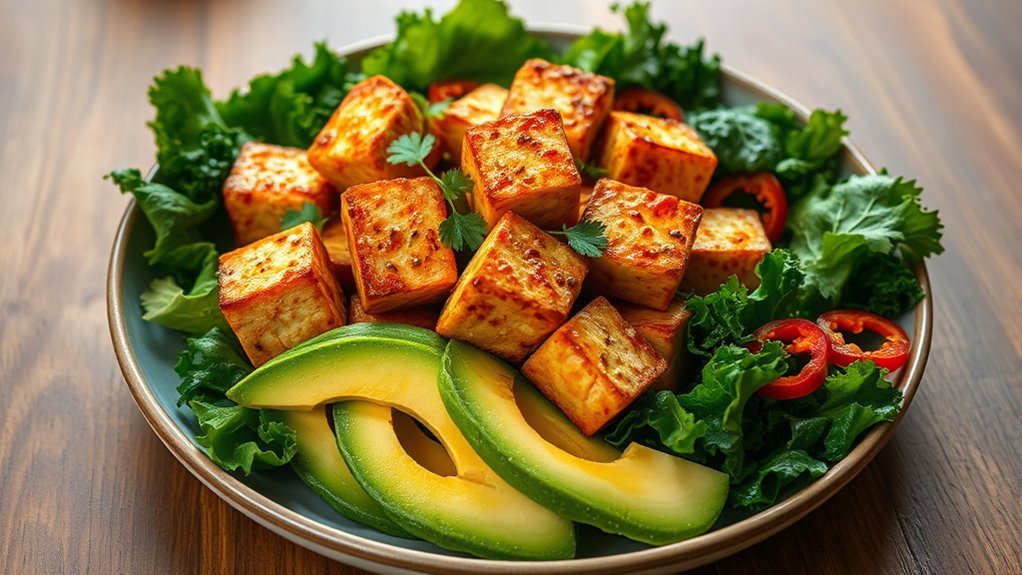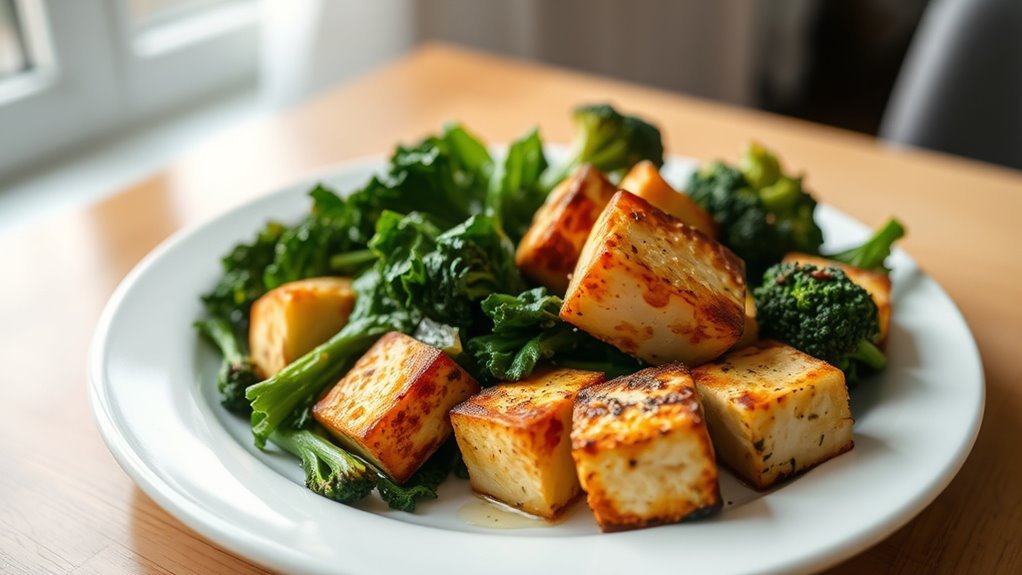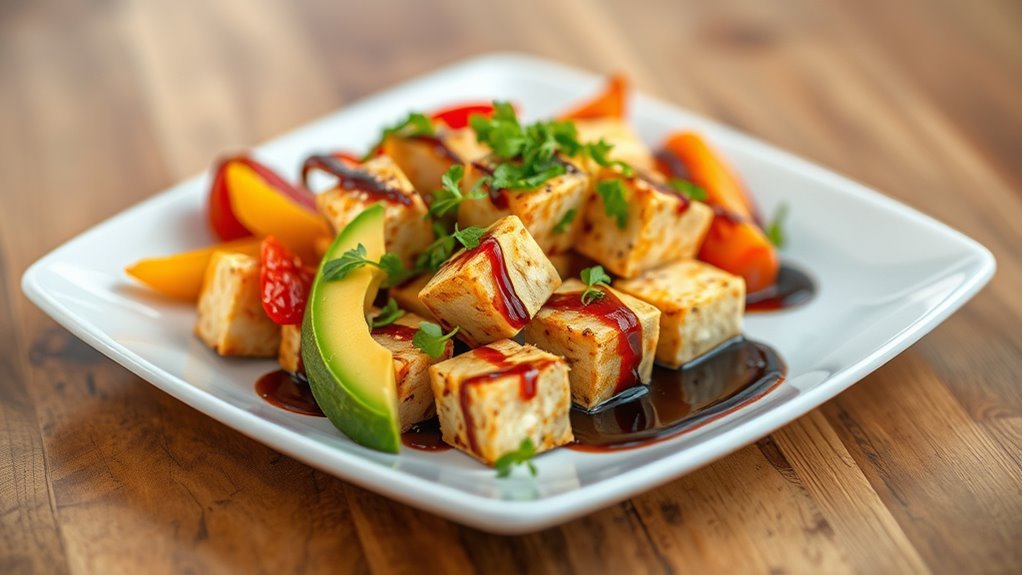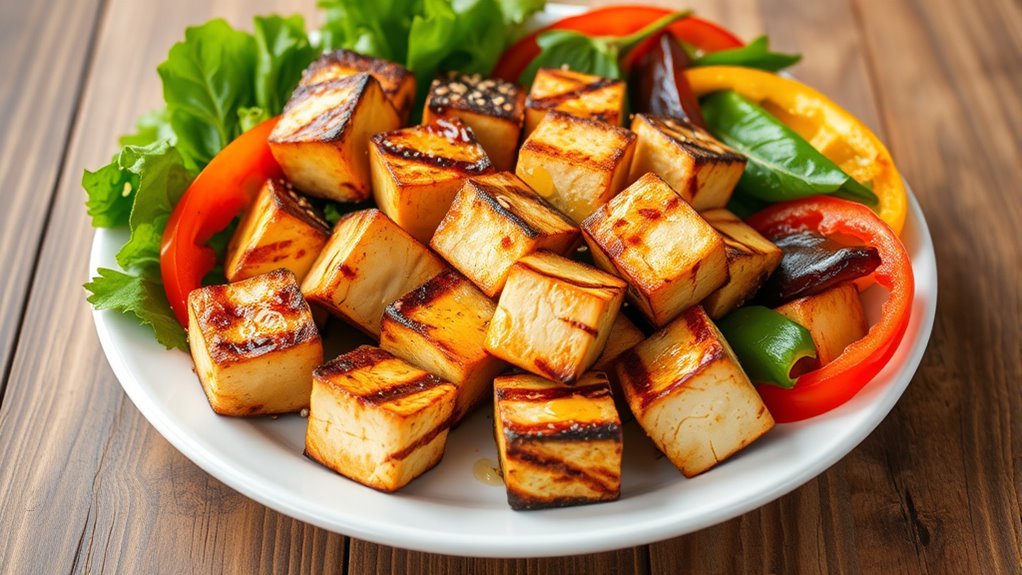Yes, you can definitely eat tofu on a keto diet. It’s low in carbohydrates, with firm tofu containing about 1.9 grams of carbs per 100 grams, making it a great meat alternative. Plus, it offers around 8 grams of protein per serving and is rich in essential minerals like calcium and iron. Tofu’s versatility allows you to experiment with various recipes. If you’re looking for meal ideas or cooking tips, there’s so much more to explore!
Understanding Tofu’s Nutritional Profile

When you consider incorporating tofu into your keto diet, it’s essential to understand its nutritional profile. Tofu, derived from soybeans, comes in various types—silken, firm, and extra-firm—each offering unique textures and uses. Silken tofu is great for smoothies or desserts, while firm and extra-firm varieties hold up well in stir-fries and grilling.
In terms of cooking methods, you can sauté, bake, or grill tofu, allowing you to experiment with flavors and textures. Tofu is primarily composed of protein, making it a fantastic meat alternative. It’s low in carbs, which aligns well with keto principles. However, be mindful of the specific tofu variety you choose, as nutritional content can vary. Understanding these aspects empowers you to make informed dietary choices. Additionally, tofu’s low carbohydrate content typically ranges from 1 to 2 grams per 100 grams, making it an excellent choice for maintaining ketosis.
Tofu and Carbohydrate Content

Tofu is often celebrated for its low carbohydrate content, making it a suitable option for those following a keto diet. When you look at various tofu varieties, like firm, soft, and silken, you’ll find that their carbohydrate levels can vary slightly. Generally, firm tofu contains about 1.9 grams of carbs per 100 grams, while soft and silken varieties may have around 2.3 grams. These numbers make tofu a fantastic choice for keto enthusiasts compared to higher-carb options like beans or grains. When doing carb comparisons, you’ll see that tofu’s low carb content allows you to enjoy it in moderation without risking ketosis. This versatility lets you explore different recipes while staying aligned with your dietary goals. Additionally, monitoring individual responses to carbohydrate intake is essential for maintaining effective ketosis.
Benefits of Including Tofu in a Keto Diet

Many people find that including tofu in their keto diet offers several advantages. Here are some key tofu health benefits that make it a great protein source:
- Low in Carbs: Tofu’s minimal carbohydrate content fits perfectly into your keto lifestyle.
- High Protein: With around 8 grams of protein per serving, it’s an excellent alternative to meat.
- Nutrient-Rich: Tofu is packed with essential minerals like calcium and iron, supporting bone health and energy levels.
- Versatile: It can be easily incorporated into various dishes, allowing for culinary creativity without compromising your diet. Additionally, its low carbohydrate profile supports the principles of a ketogenic diet.
Delicious Keto-Friendly Tofu Recipes
While exploring delicious ways to incorporate tofu into your keto meals, you’ll discover a variety of recipes that not only satisfy your taste buds but also align with your dietary goals. One standout option is a tofu stir fry, where you can sauté firm tofu with your favorite low-carb vegetables like bell peppers and broccoli, adding soy sauce or coconut aminos for flavor. Alternatively, try creating keto salads featuring marinated tofu cubes, mixed greens, and a zesty dressing. These dishes are not only rich in protein and low in carbs but also versatile enough to keep your meals exciting. By experimenting with different spices and ingredients, you’ll find the perfect balance that suits your keto lifestyle. Enjoy the freedom of flavorful dining!
Tips for Incorporating Tofu Into Your Meal Plan
When you’re looking to incorporate tofu into your meal plan, a few key strategies can make the process seamless and enjoyable. Here are four tips to help you get started:
- Tofu Preparation: Experiment with different types of tofu (firm, silken, or extra firm) to find the texture that fits your dishes best.
- Marinate for Flavor: Use low-carb marinades to enhance the taste and absorb flavors better.
- Meal Combinations: Pair tofu with keto-friendly vegetables like spinach, bell peppers, or broccoli for a balanced meal.
- Try Various Cooking Methods: Roast, stir-fry, or grill tofu to add versatility and keep your meals exciting.
Frequently Asked Questions
Is Tofu Safe for People With Soy Allergies?
If you’ve got a soy allergy, tofu’s not your friend; it’s like a wolf in sheep’s clothing. Instead, consider tofu alternatives that dance gracefully around allergens, like chickpeas or tempeh made from other beans. These substitutes can offer similar textures and flavors without the risk. Always check labels, and consult a healthcare professional to verify you’re steering your dietary choices safely, keeping your freedom to enjoy food without worry intact.
Can Tofu Cause Digestive Issues on a Keto Diet?
Tofu can cause digestive issues for some people on a keto diet, particularly if you’re not used to soy products. While it’s low in carbs, tofu digestion may lead to keto symptoms like bloating or gas. This can happen due to its fiber content and potential soy sensitivity. If you notice discomfort after eating tofu, it might be best to limit your intake or try different forms, like fermented tofu, which can be easier on the gut.
How Does Tofu Compare to Other Protein Sources?
Tofu’s a great protein source, especially for those seeking plant-based options. Its nutrition profile offers about 8 grams of protein per 100 grams, comparable to other legumes. While animal proteins like chicken or beef may have higher protein quality due to complete amino acid profiles, tofu provides a balanced option for vegetarians. It’s low in carbs, making it appealing for various diets, but you might want to verify you’re meeting all essential amino acids.
What Are the Best Cooking Methods for Tofu?
The best cooking methods for tofu include grilling and stir-frying. For grilling, marinate your tofu in flavorful tofu marinades to enhance its taste. Use firm tofu for better texture on the grill; this method adds a nice char and smoky flavor. Stir-frying is another great choice, allowing you to combine tofu with veggies and sauces for a quick meal. Experiment with both techniques to find what suits your palate best!
Is There a Difference Between Firm and Silken Tofu?
Yes, there’s definitely a difference between firm and silken tofu. Firm tofu has a denser texture, making it perfect for grilling or stir-frying, while silken tofu’s creamy consistency works great in smoothies or soups. Think of firm tofu as a sturdy building block, and silken tofu as a soft, flexible canvas. Both add cooking versatility to your meals, allowing you to explore various tofu textures and create delicious dishes that suit your taste.
References
- https://www.healthline.com/nutrition/tofu-keto
- https://www.medicalnewstoday.com/articles/324951
- https://www.ncbi.nlm.nih.gov/pmc/articles/PMC6839530/
- https://www.ketodietapp.com/Blog/post/Tofu-and-the-Keto-Diet
- https://www.verywellfit.com/can-you-eat-tofu-on-keto-5197438
- https://www.bbcgoodfood.com/howto/guide/how-make-tofu-keto-friendly
- https://www.mayoclinic.org/healthy-lifestyle/nutrition-and-healthy-eating/expert-answers/tofu/faq-20058109


